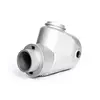Mobile:+86-311-808-126-83
Email:info@ydcastings.com
end caps for steel tubing
Understanding End Caps for Steel Tubing
Steel tubing is a versatile material widely used in construction, manufacturing, and various engineering applications. One essential component associated with steel tubing is the end cap. Although often overlooked, end caps play a crucial role in enhancing the functionality, safety, and longevity of steel tubing structures. In this article, we will delve into the importance of end caps for steel tubing, their types, applications, and installation considerations.
What are End Caps?
End caps are fittings that are installed at the open ends of steel tubes. They serve multiple purposes, such as sealing the ends of the tubing, preventing the ingress of moisture and contaminants, and enhancing the overall aesthetic appeal of the structure. Additionally, end caps are employed to add safety, ensuring that the edges of the tubing are not sharp or exposed, minimizing the risk of injury.
Types of End Caps
There are several types of end caps designed to meet various specifications and requirements
1. Flat End Caps These are the most common type of end caps, featuring a flat surface to cover the end of the tube. They are easy to install and are typically made of the same material as the tubing, ensuring compatibility.
2. Socket End Caps These caps have a recessed interior that allows them to fit snugly over the tube's end. They provide a more secure seal and can handle pressure better than flat end caps.
3. Screw-On End Caps Designed with threads, these end caps can be screwed onto the tubing, offering a strong and reliable seal. They are particularly useful in applications that require frequent access to the interior of the tube, as they can be easily removed.
4. Weld-On End Caps For a permanent seal, weld-on end caps are an excellent choice. They are welded to the end of the tube, ensuring a secure and leak-proof joint. This type is commonly used in high-pressure applications.
5. Rubber and Plastic End Caps While steel is the most common material for tubing, rubber and plastic end caps offer an alternative for certain applications. They provide excellent resistance to corrosion and can dampen vibrations, making them ideal for specific environments.
Applications of End Caps
end caps for steel tubing

End caps are utilized in a variety of industries and applications, including
- Construction In construction projects, steel tubing is often used for railings, scaffolding, and structural supports. End caps are vital in these applications to enhance safety and prevent injuries from exposed edges. - Manufacturing Many manufacturing processes involve the use of steel tubing for conveyors and support structures. End caps are essential to keep debris out and maintain operational efficiency.
- Automotive Industry In automotive applications, steel tubing is used for exhaust systems and chassis components. End caps provide a means to prevent exhaust leaks and protect sensitive components.
- Furniture Steel tubing has gained popularity in custom furniture design. Adding end caps gives a finished look to items such as tables and chairs while also protecting flooring from scratches.
Installation Considerations
When installing end caps, several factors should be considered to ensure optimal performance
- Material Compatibility It is crucial to select end caps made from compatible materials to maintain the structural integrity of the tubing.
- Proper Sizing End caps must fit snugly to prevent moisture and debris from entering. Therefore, measuring the inner diameter of the tubing accurately before selecting an end cap is vital.
- Sealant Use In applications that may be exposed to high moisture or chemicals, using an appropriate sealant alongside end caps can enhance protection against leaks.
- Regular Inspections Periodically inspecting the end caps for signs of wear or corrosion can help ensure that they continue to provide adequate protection and seal.
Conclusion
In summary, end caps play a critical role in the functionality and safety of steel tubing applications. With various types available, users can select the appropriate end cap to suit their specific needs. Whether in construction, manufacturing, or automotive sectors, end caps help ensure the integrity of structures and enhance safety. Therefore, understanding the importance of end caps and their proper usage can significantly impact the performance and longevity of steel tubing in various applications.
-
Why Should You Invest in Superior Pump Castings for Your Equipment?NewsJun.09,2025
-
Unlock Performance Potential with Stainless Impellers and Aluminum End CapsNewsJun.09,2025
-
Revolutionize Your Machinery with Superior Cast Iron and Aluminum ComponentsNewsJun.09,2025
-
Revolutionize Fluid Dynamics with Premium Pump ComponentsNewsJun.09,2025
-
Optimizing Industrial Systems with Essential Valve ComponentsNewsJun.09,2025
-
Elevate Grid Efficiency with High-Precision Power CastingsNewsJun.09,2025











